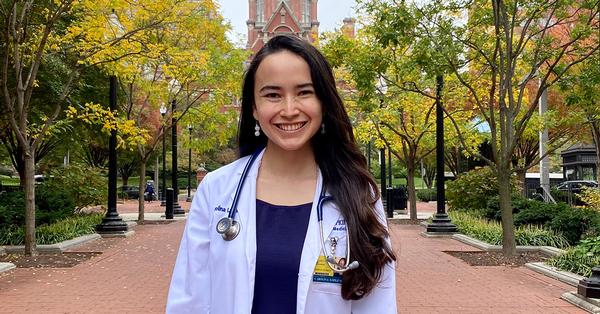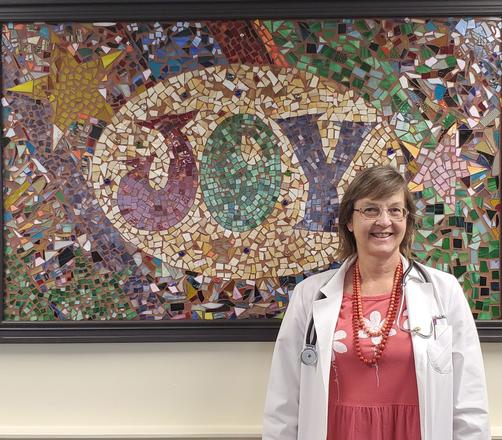School of Medicine Student Supports Latino Community Through Tutoring
Lopez-Silva Volunteers at CASA and Helps Baltimore’s Immigrant Youth

School of Medicine student Carolina Lopez-Silva
When Carolina Lopez-Silva moved to the United States in 2016 from Bogota, Colombia, she wanted to connect with other immigrants in her community. Now a second-year Johns Hopkins University School of Medicine student, she tutors immigrant youth through CASA of Baltimore, a large grass-roots immigrant advocacy organization.
“Community service is important as a medical student,” says Lopez-Silva, who graduated from William & Mary in 2020. “If we don’t understand the political, social and economic factors affecting the communities’ health, we won’t be as prepared to help those communities.”
Lopez-Silva is part of the Service Scholars program, a component of SOURCE, the community engagement and service-learning center for The Johns Hopkins University’s schools of public health, nursing and medicine. The program trains Johns Hopkins students to work as project managers at community organizations while learning how to move a project from start to finish. They learn the stages of project management, manage people and learn to delegate. They must also recruit four of their peers to be volunteers.
“Medical school is a very intense time,” says Rosemary Riel, SOURCE’s assistant director for academic service-learning. “The Service Scholars program is an opportunity for the students to develop a different lens on the communities they’ll be working with. It humanizes the practice of medicine beyond the traditional clinic focus.”
Lopez-Silva began volunteering as a coordinator and outreach specialist for Mi Espacio, CASA’s youth program, last September. Four times each week, she supports immigrant youth during after-school programs that focus on academic success.
“Many of the students in CASA are immigrants themselves, from places like Venezuela and El Salvador, or they are first-generation Americans,” Lopez-Silva explains. “They need help with English or other subjects. We provide a space where they feel comfortable. Many of the tutors are bilingual and can speak to the students in their native language.”
Lopez-Silva says many of the students she tutors hope to go to college, and she assists them with college applications. CASA also helps families with their taxes, provides legal assistance and offers health care services.
“CASA helps open a lot of doors for the students,” she says. “The more support, the better.”
Tatiana, a high school junior in the Mi Espacio program, says the help with schoolwork, summer internship applications and English has aided her in preparing for the future.
“I feel very happy and grateful because they have supported me and helped me get ahead,” Tatiana says. “Ms. Lopez encouraged me when I felt I couldn't learn English. She is a good person and I am very grateful to her for supporting me and helping me move forward in difficult times.”
Diego Torres Diaz, CASA’s former youth program coordinator, says Lopez-Silva helped formalize the tutoring program.
“She’s extremely organized,” he says. “She took charge of the onboarding process for tutors. Carolina helped track data and kept a progress monitoring system. She also worked to create mental health workshops for the students. She made sure students were put at the forefront and that their voices were being heard.”
Lopez-Silva has built a strong base of volunteers for Mi Espacio. While she was only required to recruit four volunteers, she ended up getting 13 for the tutoring program.
Erik Almazan, a fourth-year school of medicine student, is one of those volunteers.
“Because of the pandemic, it was difficult to find in-person activities,” Almazan says. “Carolina sent an email to the Latino Medical Student Association, talking about the opportunity at CASA. It seemed like a great way to get involved in the community.”
Almazan says Lopez-Silva is a great volunteer coordinator.
“She’s always available to answer questions,” he says. “She’s friendly and kind to everyone. She makes an effort to help with whatever is needed.”
Almazan says he enjoys helping the students get to know their new environment.
“We try to give students a sense of empowerment,” he says. “There are many bright kids in the program and one of their most significant barriers is understanding English, so we work to help them get more comfortable with the language. It’s a rewarding experience because we give them confidence.”
Lopez-Silva has also been active in the Johns Hopkins Health Education and Training (HEAT) Corps during the pandemic, answering students’ COVID-19 questions. In addition, she volunteered at a COVID-19 testing clinic at the Sacred Heart of Jesus Church, where she helped enroll people in Johns Hopkins MyChart to see their test results.
Lopez-Silva has worked with Centro SOL, an organization that promotes equity in health and opportunity for the Latino community, to help create a MyChart enrollment video in Spanish and screen patients for pre-diabetes. And she led a Facebook Live session on COVID-19 testing.
“This work has made me more aware of the different challenges that the East Baltimore community faces,” Lopez-Silva says. “When I started medical school, I wasn’t sure what my career would look like. Now I have a better idea. I want service, leadership and advocacy to be part of my future career. I’m grateful for these opportunities.”


